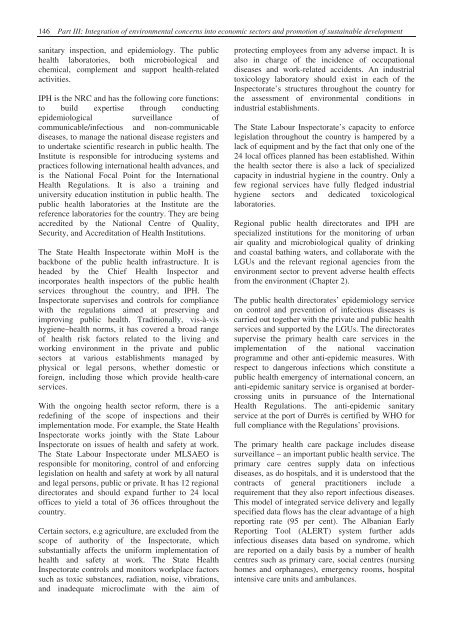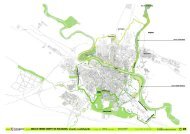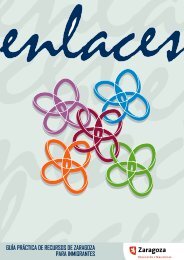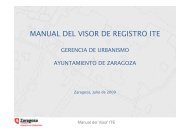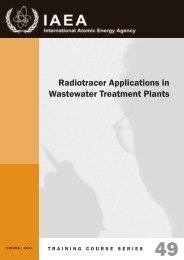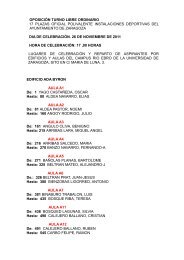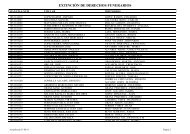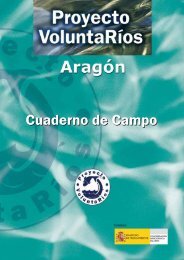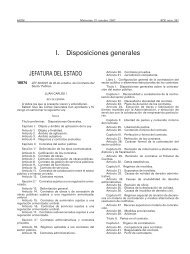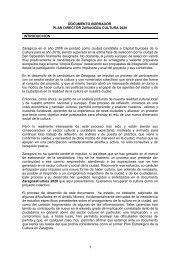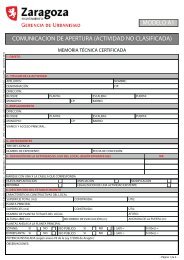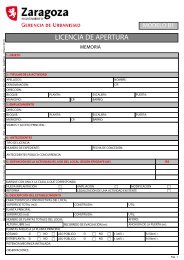Chapter 10: Human health and environment145Furthermore, the scope <strong>of</strong> pollution control measureshas been broadened to include several environmentmediatedfactors <strong>of</strong> public health relevance such aswaste, chemicals, POPs, radiation, noise andvibration in specific settings, and odours. Third,environmental monitoring is envisioned to cover notonly the state <strong>of</strong> the environment but also toencompass monitoring the impacts <strong>of</strong> environmentalpollution on human health. Fourth, the environmentalinformation system should integrate data on effects<strong>of</strong> environmental pollution on human health.The PRTR, which is to be established in adherence tothe UNECE Protocol on PRTRs <strong>of</strong> the AarhusConvention, is an effective policy instrument forpollution control at the source and, at the same time,an information service on the emission <strong>of</strong> pollutantsinto the environment. This service is <strong>of</strong> particularhealth relevance as it provides important signals forpreventive actions on hazardous releases before theeffects on health have taken place, as, for example, inthe case <strong>of</strong> POPs.The new Law on <strong>Environmental</strong> Impact Assessmentdetermines the general requirements <strong>of</strong> an EIA,specifies the preliminary and pr<strong>of</strong>ound assessmentprocedures and criteria for selecting projects andprogrammes subject to those assessments, the publicopinion and consultation process, the certification <strong>of</strong>experts and sanctions. An assessment is defined asthe establishment <strong>of</strong> the possible direct and indirecteffects <strong>of</strong> a given activity on the soil, water, sea, air,forest, climate, human beings, flora and fauna,landscape, material assets and cultural heritage,taking into account their mutual interrelations.However, the definition does not imply anyassessment <strong>of</strong> environmental health impacts.The 2009 Law on Public Health, No. 10138,introduced the public health sector reform andmodernization, in particular a shift from lengthy andcostly treatment to disease prevention, healthpromotion and action on health risks such as drinkingwater and air quality control. Essential public healthactivities within the system include: (a) monitoringpeople’s health status and trends in order to identifyhealth problems and risk factors, (b) strengtheninglaws and regulations for health protection ensuringthe relevant capacities, (c) preparing, planning andtaking relief measures in the face <strong>of</strong> public healthemergencies. Furthermore, environmental healthmonitoring and health and safety at work, publichealth information and epidemiological surveillanceare at the core <strong>of</strong> the public health services package.The Law on Public Health sets provisions forenvironmental public health policy measures alongthe four main axes: monitoring and assessment <strong>of</strong>environmental impacts on health, preparation andcontrol <strong>of</strong> hygiene–health norms, implementation <strong>of</strong>interventions to eliminate or minimize the direct orindirect environmental impacts on health, andcitizens’ education on environment and healthprotection.The 2003 Law on Chemical Substances and Agents,No. 9108, regulates the management <strong>of</strong> chemicalsubstances and preparations for the protection <strong>of</strong> lifeand health <strong>of</strong> people and animals, as well as for theprotection <strong>of</strong> the environment from risks caused byhazardous substances. It is based on the GloballyHarmonized System <strong>of</strong> Classification and Labelling<strong>of</strong> Chemicals (GHS). A new law is planned to beprepared in 2012 following the EU REACHDirective. A further legal advancement in the field isthe recent transposition <strong>of</strong> the EU IntegratedPollution Prevention and Control Directive(96/61/EC).The 2010 Law on Safety and Health at Work, No.10237, transposed the relevant EU FrameworkDirective (89/391/EEC). It introduced new concepts,such as employers’ obligations regarding riskassessment, along with prevention and protectionmeasures, the services provided by external bodiesfor health protection and prevention <strong>of</strong> workplacesafety-related risks, and workers’ participation. Italso introduced a classification <strong>of</strong> accidents at work,depending on their consequences and the number <strong>of</strong>persons involved. This, along with the recentadoption <strong>of</strong> the European classification <strong>of</strong> economicactivities, should enable <strong>Albania</strong> to generate andreport key statistics on work-related injuries applyingharmonized approaches in the future.Institutional frameworkMoH, through its Department <strong>of</strong> Public Health, is thecentral institution responsible for determining,coordinating and directing public health policy. It issupported by the National Council <strong>of</strong> Public Health,an advisory body with the aim <strong>of</strong> securing a widerbackground for public health policies and thefunctioning <strong>of</strong> the public health system. The technicalsupport and information necessary for thedevelopment <strong>of</strong> national public health policies andstrategies is provided by IPH, which is subordinatedto MoH through the State Health Inspectorate.At present, the country’s infrastructure integrates 36public health directorates, 12 in each <strong>of</strong> theadministrative regions and 24 in LGUs, i.e.municipalities and communes. They provide publichealth services in the main strands <strong>of</strong> hygiene and
146 Part III: Integration <strong>of</strong> environmental concerns into economic sectors and promotion <strong>of</strong> sustainable developmentsanitary inspection, and epidemiology. The publichealth laboratories, both microbiological andchemical, complement and support health-relatedactivities.IPH is the NRC and has the following core functions:to build expertise through conductingepidemiological surveillance <strong>of</strong>communicable/infectious and non-communicablediseases, to manage the national disease registers andto undertake scientific research in public health. TheInstitute is responsible for introducing systems andpractices following international health advances, andis the National Focal Point for the InternationalHealth Regulations. It is also a training anduniversity education institution in public health. Thepublic health laboratories at the Institute are thereference laboratories for the country. They are beingaccredited by the National Centre <strong>of</strong> Quality,Security, and Accreditation <strong>of</strong> Health Institutions.The State Health Inspectorate within MoH is thebackbone <strong>of</strong> the public health infrastructure. It isheaded by the Chief Health Inspector andincorporates health inspectors <strong>of</strong> the public healthservices throughout the country, and IPH. TheInspectorate supervises and controls for compliancewith the regulations aimed at preserving andimproving public health. Traditionally, vis-à-vishygiene–health norms, it has covered a broad range<strong>of</strong> health risk factors related to the living andworking environment in the private and publicsectors at various establishments managed byphysical or legal persons, whether domestic orforeign, including those which provide health-careservices.With the ongoing health sector reform, there is aredefining <strong>of</strong> the scope <strong>of</strong> inspections and theirimplementation mode. For example, the State HealthInspectorate works jointly with the State LabourInspectorate on issues <strong>of</strong> health and safety at work.The State Labour Inspectorate under MLSAEO isresponsible for monitoring, control <strong>of</strong> and enforcinglegislation on health and safety at work by all naturaland legal persons, public or private. It has 12 regionaldirectorates and should expand further to 24 local<strong>of</strong>fices to yield a total <strong>of</strong> 36 <strong>of</strong>fices throughout thecountry.Certain sectors, e.g agriculture, are excluded from thescope <strong>of</strong> authority <strong>of</strong> the Inspectorate, whichsubstantially affects the uniform implementation <strong>of</strong>health and safety at work. The State HealthInspectorate controls and monitors workplace factorssuch as toxic substances, radiation, noise, vibrations,and inadequate microclimate with the aim <strong>of</strong>protecting employees from any adverse impact. It isalso in charge <strong>of</strong> the incidence <strong>of</strong> occupationaldiseases and work-related accidents. An industrialtoxicology laboratory should exist in each <strong>of</strong> theInspectorate’s structures throughout the country forthe assessment <strong>of</strong> environmental conditions inindustrial establishments.The State Labour Inspectorate’s capacity to enforcelegislation throughout the country is hampered by alack <strong>of</strong> equipment and by the fact that only one <strong>of</strong> the24 local <strong>of</strong>fices planned has been established. Withinthe health sector there is also a lack <strong>of</strong> specializedcapacity in industrial hygiene in the country. Only afew regional services have fully fledged industrialhygiene sectors and dedicated toxicologicallaboratories.Regional public health directorates and IPH arespecialized institutions for the monitoring <strong>of</strong> urbanair quality and microbiological quality <strong>of</strong> drinkingand coastal bathing waters, and collaborate with theLGUs and the relevant regional agencies from theenvironment sector to prevent adverse health effectsfrom the environment (Chapter 2).The public health directorates’ epidemiology serviceon control and prevention <strong>of</strong> infectious diseases iscarried out together with the private and public healthservices and supported by the LGUs. The directoratessupervise the primary health care services in theimplementation <strong>of</strong> the national vaccinationprogramme and other anti-epidemic measures. Withrespect to dangerous infections which constitute apublic health emergency <strong>of</strong> international concern, ananti-epidemic sanitary service is organised at bordercrossingunits in pursuance <strong>of</strong> the InternationalHealth Regulations. The anti-epidemic sanitaryservice at the port <strong>of</strong> Durrës is certified by WHO forfull compliance with the Regulations’ provisions.The primary health care package includes diseasesurveillance – an important public health service. Theprimary care centres supply data on infectiousdiseases, as do hospitals, and it is understood that thecontracts <strong>of</strong> general practitioners include arequirement that they also report infectious diseases.This model <strong>of</strong> integrated service delivery and legallyspecified data flows has the clear advantage <strong>of</strong> a highreporting rate (95 per cent). The <strong>Albania</strong>n EarlyReporting Tool (ALERT) system further addsinfectious diseases data based on syndrome, whichare reported on a daily basis by a number <strong>of</strong> healthcentres such as primary care, social centres (nursinghomes and orphanages), emergency rooms, hospitalintensive care units and ambulances.
- Page 1 and 2:
UNITED NATIONS ECONOMIC COMMISSION
- Page 6 and 7:
vPrefaceThe second EPR of Albania b
- Page 8 and 9:
viiLIST OF TEAM MEMBERSMr. Antoine
- Page 10 and 11:
ixMinistry of Agriculture, Food and
- Page 12 and 13:
xiCONTENTSForeword ................
- Page 14 and 15:
8.3 Biological diversity ..........
- Page 16 and 17:
xvPageChapter 8Table 8.1:Table 8.2:
- Page 18 and 19:
xviiPageLIST OF PHOTOSIntroductionP
- Page 20 and 21:
xixLIST OF ABBREVIATIONSAICASCICANP
- Page 22 and 23:
xxiSIGNS AND MEASURES .. not availa
- Page 24 and 25:
xxiiiExecutive summaryThe first Env
- Page 26 and 27:
The entire education system is subj
- Page 28 and 29:
was done by international consultan
- Page 30 and 31:
1Introduction I.1 Physical contextA
- Page 32 and 33:
Introduction3The country has deposi
- Page 34 and 35:
Introduction5Photo I.1: Ruins of Sk
- Page 36:
PART I: POLICYMAKING, PLANNING AND
- Page 39 and 40:
10 Part I: Policymaking, planning a
- Page 41 and 42:
12 Part I: Policymaking, planning a
- Page 43 and 44:
14 Part I: Policymaking, planning a
- Page 45 and 46:
16 Part I: Policymaking, planning a
- Page 47 and 48:
18 Part I: Policymaking, planning a
- Page 49 and 50:
20 Part I: Policymaking, planning a
- Page 51 and 52:
22 Part I: Policymaking, planning a
- Page 53 and 54:
24 Part I: Policymaking, planning a
- Page 55 and 56:
26 Part I: Policymaking, planning a
- Page 57 and 58:
28 Part I: Policymaking, planning a
- Page 59 and 60:
30 Part I: Policymaking, planning a
- Page 61 and 62:
32 Part I: Policymaking, planning a
- Page 63 and 64:
34 Part I: Policymaking, planning a
- Page 65 and 66:
36 Part I: Policymaking, planning a
- Page 67 and 68:
38 Part I: Policymaking, planning a
- Page 69 and 70:
40 Part I: Policymaking, planning a
- Page 71 and 72:
42 Part I: Policymaking, planning a
- Page 73 and 74:
44 Part I: Policymaking, planning a
- Page 75 and 76:
46 Part I: Policymaking, planning a
- Page 77 and 78:
48 Part I: Policymaking, planning a
- Page 79 and 80:
50 Part I: Policymaking, planning a
- Page 81 and 82:
52 Part I: Policymaking, planning a
- Page 83 and 84:
54 Part I: Policymaking, planning a
- Page 85 and 86:
56 Part I: Policymaking, planning a
- Page 87 and 88:
58 Part I: Policymaking, planning a
- Page 89 and 90:
60 Part I: Policymaking, planning a
- Page 91 and 92:
62 Part I: Policymaking, planning a
- Page 93 and 94:
64 Part I: Policymaking, planning a
- Page 96 and 97:
67Chapter 5ECONOMIC INSTRUMENTS AND
- Page 98 and 99:
Chapter 5: Economic instruments and
- Page 100 and 101:
Chapter 5: Economic instruments and
- Page 102 and 103:
Chapter 5: Economic instruments and
- Page 104 and 105:
Chapter 5: Economic instruments and
- Page 106 and 107:
Chapter 5: Economic instruments and
- Page 108:
PART III: INTEGRATION OF ENVIRONMEN
- Page 111 and 112:
82 Part III: Integration of environ
- Page 113 and 114:
84 Part III: Integration of environ
- Page 115 and 116:
86 Part III: Integration of environ
- Page 117 and 118:
88 Part III: Integration of environ
- Page 119 and 120:
90 Part III: Integration of environ
- Page 121 and 122:
92 Part III: Integration of environ
- Page 124 and 125: 95Chapter 7WASTE MANAGEMENT7.1 Intr
- Page 126 and 127: Chapter 7: Waste management97sold f
- Page 128 and 129: Chapter 7: Waste management99SitesC
- Page 130 and 131: Chapter 7: Waste management101Table
- Page 132 and 133: Chapter 7: Waste management103• C
- Page 134 and 135: Chapter 7: Waste management105sever
- Page 136: Chapter 7: Waste management107(b) E
- Page 139 and 140: 110 Part III: Integration of enviro
- Page 141 and 142: 112 Part III: Integration of enviro
- Page 143 and 144: 114 Part III: Integration of enviro
- Page 145 and 146: 116 Part III: Integration of enviro
- Page 147 and 148: 118 Part III: Integration of enviro
- Page 149 and 150: 120 Part III: Integration of enviro
- Page 151 and 152: 122 Part III: Integration of enviro
- Page 153 and 154: 124 Part III: Integration of enviro
- Page 155 and 156: 126 Part III: Integration of enviro
- Page 157 and 158: 128 Part III: Integration of enviro
- Page 159 and 160: 130 Part III: Integration of enviro
- Page 161 and 162: 132 Part III: Integration of enviro
- Page 164 and 165: 135Chapter 10HUMAN HEALTH AND ENVIR
- Page 166 and 167: Chapter 10: Human health and enviro
- Page 168 and 169: Chapter 10: Human health and enviro
- Page 170 and 171: Chapter 10: Human health and enviro
- Page 172 and 173: Chapter 10: Human health and enviro
- Page 176 and 177: Chapter 10: Human health and enviro
- Page 178: Chapter 10: Human health and enviro
- Page 182 and 183: 153Annex IIMPLEMENTATION OF THE REC
- Page 184 and 185: The new 2011 Law on Environmental P
- Page 186 and 187: Recommendation 3.2:Albania needs to
- Page 188 and 189: Recommendation 4.2:The Ministry of
- Page 190 and 191: for 2004 was prepared within the St
- Page 192 and 193: 163Chapter 6: WATER MANAGEMENTRecom
- Page 194 and 195: There is no updated water resources
- Page 196 and 197: international consulting and author
- Page 198 and 199: it is limited only to the level of
- Page 200 and 201: taken. In addition, NES2, under MoE
- Page 202 and 203: 173Chapter 12: HUMAN HEALTH AND THE
- Page 204: Recommendation 12.5:(a) The Ministr
- Page 207 and 208: 178Worldwide agreementsYear1979 (BO
- Page 210 and 211: 181Annex IIISELECTED ECONOMIC AND E
- Page 212 and 213: 183Land resources and soil 2002 200
- Page 214: Education 2002 2003 2004 2005 2006
- Page 217 and 218: 188Law on Local Tax System, No. 963
- Page 220 and 221: 191SourcesIndividual authors1. Bego
- Page 222 and 223: 19336. Albania, Ministry of Environ
- Page 224 and 225:
19568. National Agency of Natural R
- Page 226 and 227:
197101. International POPs Eliminat
- Page 228 and 229:
199UNDP and Ministry of Environment
- Page 230:
201172. National Agency for Environ


